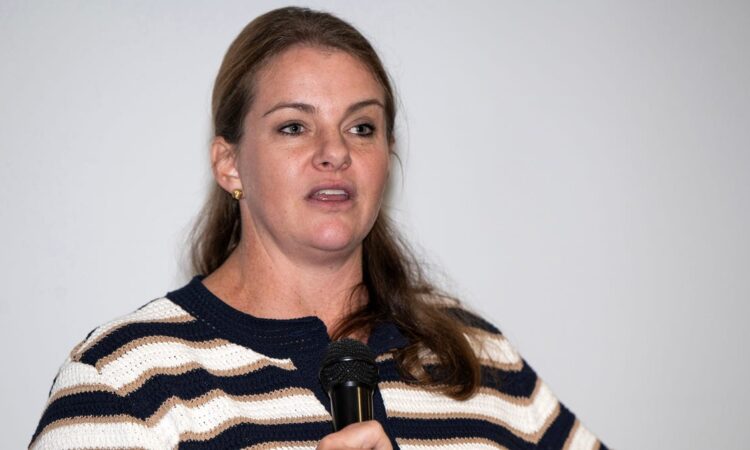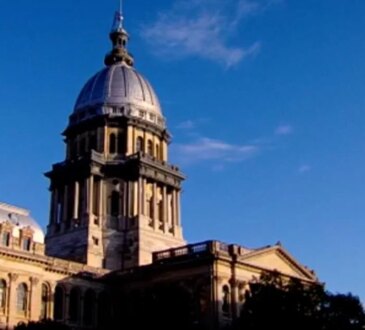
Local government services funded by property tax would need new revenue or be cut

Intent of Senate Bill 180 was altered to accomodate developers
State Rep. Fiona McFarland shared her thoughts on key state issues, including the intent of Senate Bill 180, when first drafted by lawmakers
- State Rep. Fiona McFarland highlighted her legislative accomplishments, including the Florida Wildlife Corridor Act and a law restricting social media for teens.
- McFarland anticipates a constitutional amendment on property tax reform will be a defining issue in the next legislative session.
- She expressed concerns about replacing property taxes with sales tax, citing potential instability during economic downturns.
- McFarland is working to clarify the intent of Senate Bill 180, which was meant to aid hurricane recovery but has faced broader legal interpretations.
VENICE – State Rep. Fiona McFarland, R-Sarasota, shared her thoughts on key state issues Friday, Oct. 3, with members of the South County Tiger Bay Club.
She discussed topics ranging from the initial intent of Senate Bill 180 to the prospect of whether a constitutional amendment changing property taxes will be put before voters in 2026.
McFarland, in the middle of her third term, has represented Venice, along with Sarasota and Longboat Key since a 2022 redistricting.
McFarland is also chair of the Sarasota County State Legislative Delegation, which will meet Nov 13 at the Robert L. Anderson Administration Center, 4000 S. Tamiami Trail, Venice.
Charles Hines, a former Sarasota County Commissioner, facilitated the meeting and posed several questions to McFarland, some of which are detailed here.
Can you give us your three biggest accomplishments?
McFarland quickly led with the Florida Wildlife Corridor Act which passed in 2021. She was lead sponsor of the act that aspires to protect 18 million acres of wildlife by stitching together state and federal lands, as well as conservation easements over agricultural properties.
“I was super proud to be a part of that,” McFarland said then later called her crowning achievement a 2024 law she co-sponsored that restricts social media access for teenagers and putting the onus on social media sites to ensure that 13 and 14 year olds are not on social media and 15 and 16 year olds have parental permission to do so.
“We’re recognizing that social media is causing a significant, measurable pervasive harm for our young people and we’re going to classify it just as we do all of the other evils in society that children are not ready for: tobacco drinking, driving,” McFarland said of the law that has been challenged in federal court by social media companies over first revision issues.
“It’s hung up in the courts but I have faith it will prevail and we’ll set a standard for the whole country,” McFarland said.
Finally she touted a law that gave tax credits to employers who either provide child care to employees; as PGT Innovations did by building a preschool; or offering employees a monthly subsidy to cover the cost of child care, as Gold Coast Eagle Distributing does.
McFarland later added that the next tech bill she hopes to push across the finish line relates to artificial intelligence -related audio and visuals.
“The thing that scares us is … being misled,” McFarland said. “Whether it’s a picture that we think is real that is not or a voice that we think is real or is not.”
The legislation would not ban those practices but require a popup or other identified signifying that AI-related depiction is not real.
Will the state abolish property taxes?
“This is such a big issue and I think it actually will be the defining issue of our upcoming legislative session,” McFarland said, before adding that since property taxes are part of the Florida State Constitution, legislators can’t alter them directly but they can craft constitutional amendments that will let voters decide.
“There will be a constitutional amendment – there will be at least one,” McFarland said, then reminded listeners that while state government is funded by sales taxes, property taxes are used by cities and counties to fund local services.
“Of course it’s very easy for us in Tallahassee to say ‘We’re going to get rid of property tax,’ because we don’t get to spend it up there.”
The House Select Committee on Property Tax Reform met twice last week.
McFarland said she has concerns about the process and noted that a decrease or elimination of property taxes would need an increase in other revenue – the most likely solution would be an increased sales tax collected by the state and distributed to local governments through a yet-to-be determined formula.
In the short term, McFarland said that solution could work but political pressures could cause that to unravel.
“What happens when we hit a recession and no one travels to our state anymore and that tax revenue we were so excited about dries up?” she later added. “Property tax, if we’re going to ring that bell, we can’t un-ring it.
“Let’s be very certain that we can have a strong financial future for our state when we unravel property tax.”
A partial solution, such as increasing the portability of a homestead exemption or abolishing property taxes for those age 65 and older with homesteaded houses could also work, she said.
“There will be a question on your ballot and it will make it better for someone,” McFarland said.
What happened to Senate Bill 180?
“Senate Bill 180 started out about hurricanes and it really is a thing of beauty,” McFarland said, noting that one section of the law addressed debris haulers walking away from a contract – which occurred in Sarasota County and elsewhere in 2024.
“There’s penalties for guys who leave during gray skies and there’s liquidated damages which is a big disincentive,” McFarland said.
Another section addressed the collapse of a construction crane in St. Petersburg during Hurricane Milton by requiring that cranes be secured on job sites.
She said a section of the law – meant to protect homeowners from hastily enacted local laws that would create additional burden to their rebuilding.
“We wanted to be responsive to that and say for one year after a hurricane, just pause,” McFarland said. “It changed and the lawyers got a hold of it and interpreted it a very different way, which is to say any property owner, regardless of whether that property has been impacted by a hurricane can have no comp plan amendments to make it more burdensome or restrictive.
“We did want to protect the homeowners that were getting their property zoned away from them,” she added.
McFarland has been meeting with representatives of the Florida League of Cities and Association of Counties to tweak the law in the upcoming session, “To stil meet the intent of the bill but protect against some of this runaway interpretation.”
Earle Kimel primarily covers south Sarasota County as well as land development and environmental issues for the Herald-Tribune. Follow him on Facebook, and X. He can be reached by email at earle.kimel@heraldtribune.com. Support local journalism by subscribing.




